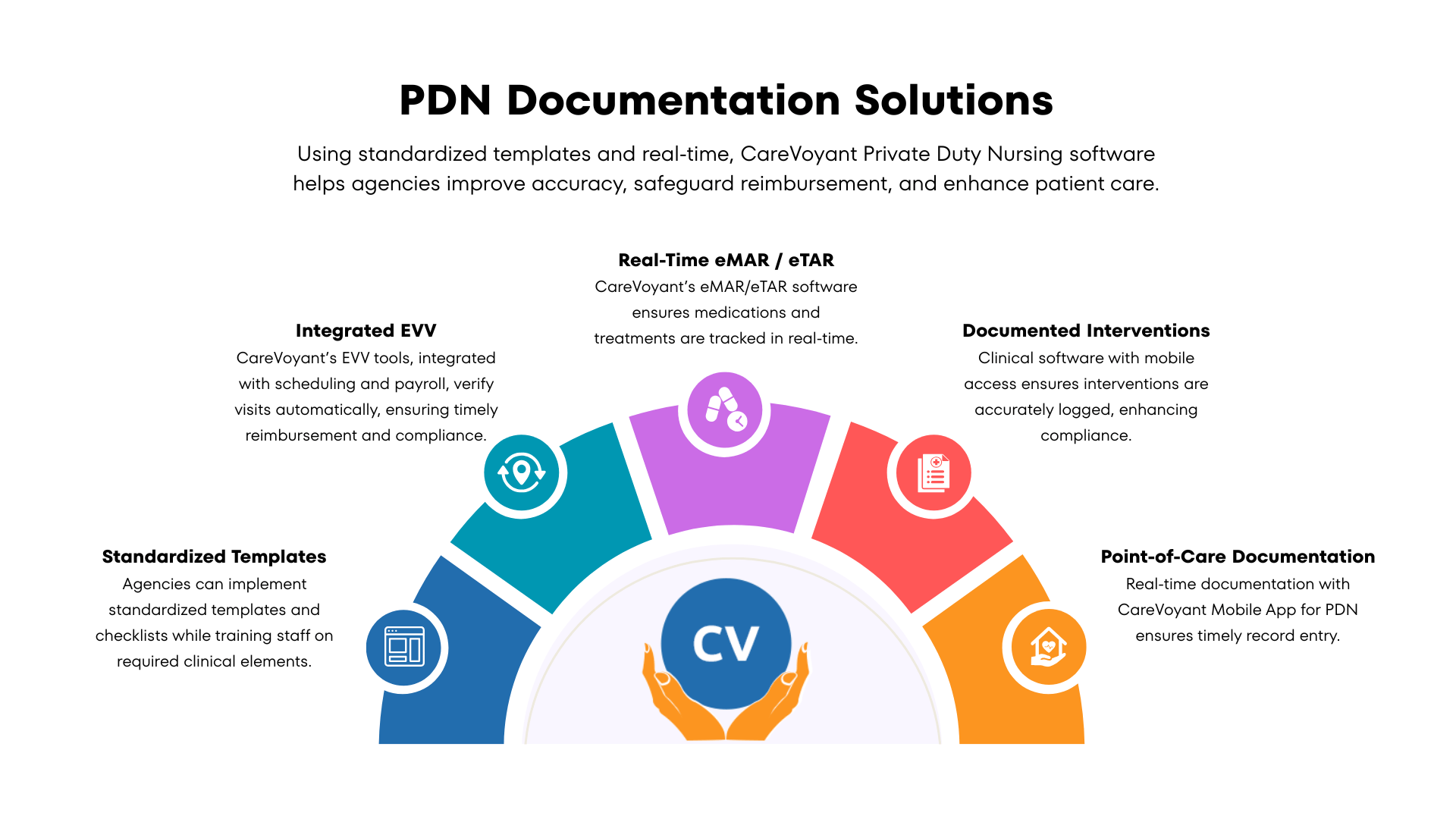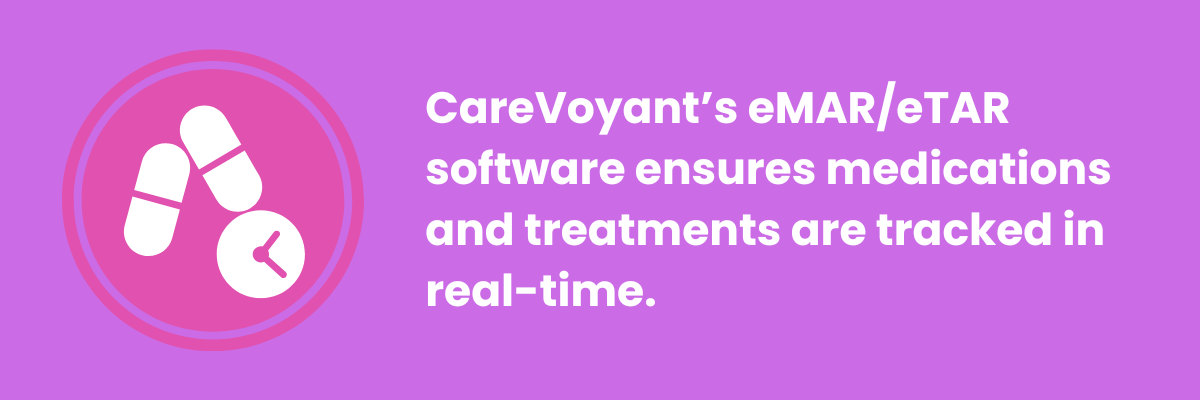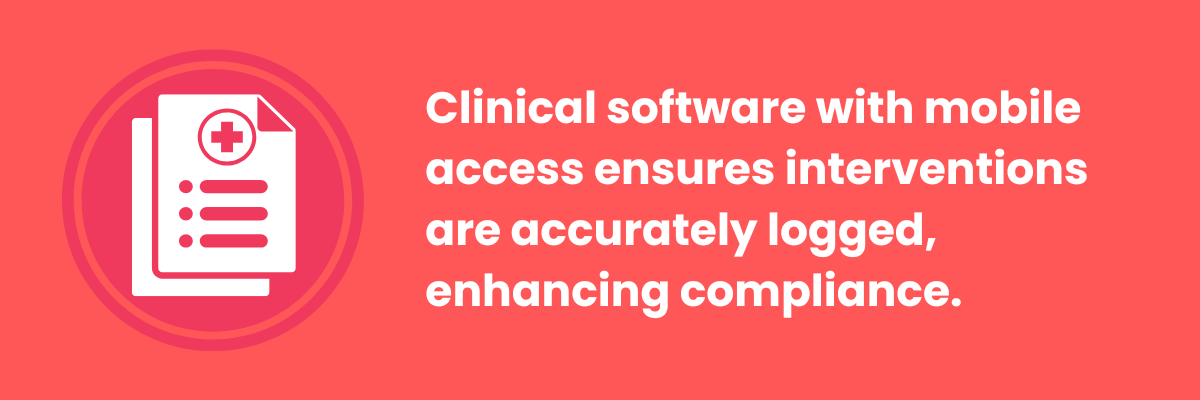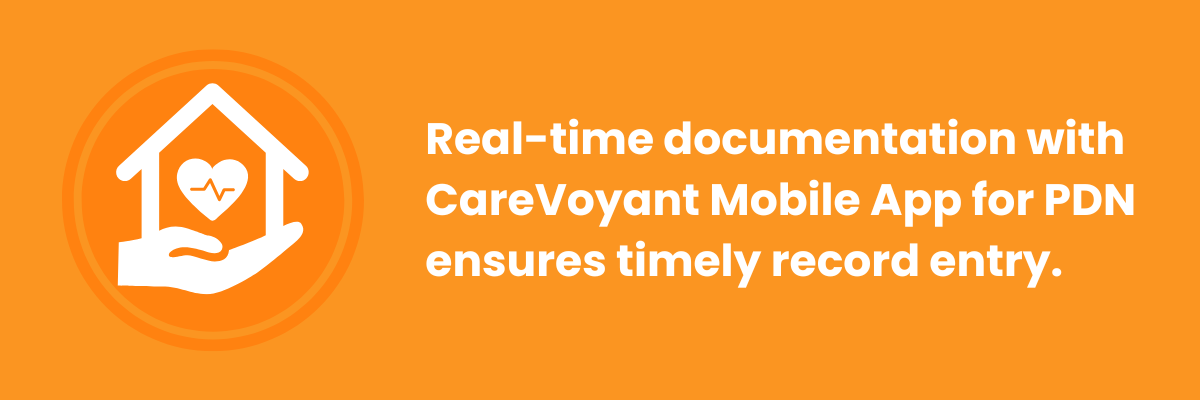Most PDN documentation errors like missing notes, inaccurate timekeeping, and delayed entries can lead to compliance risks and denied claims. Using standardized templates and real-time, CareVoyant Private Duty Nursing software helps agencies improve accuracy, safeguard reimbursement, and enhance patient care.
Introduction
Private Duty Nursing (PDN) delivers skilled, in-home care to patients with complex medical needs. But when documentation slips - missing details, vague descriptions, or late entries - compliance, reimbursement, and care quality are all at risk. In fact, CMS’s Documentation Matters Toolkit emphasizes that “providers are responsible for documenting each patient encounter completely, accurately, and on time.”
Because PDN provides one-on-one care for patients with complex medical needs, often in home or community settings, accurate documentation is critical, not only to ensure continuity of care but also to meet compliance standards and secure timely reimbursement (CMS Home Health Quality). Yet, studies show that nearly 30% of home care claims are affected by documentation errors (AHRQ Patient Safety).
Incomplete, delayed, or inaccurate records can disrupt care, trigger audits, and even lead to claim denials. In this article, we explore the five most common documentation mistakes in PDN:
Incomplete or missing clinical notes
Inaccurate timekeeping and visit records
Medication and treatment errors
Failure to capture skilled interventions clearly
Delayed documentation entries
For each, we’ll examine the problem, impact, and solution, while showing how leveraging CareVoyant Private Duty Nursing Software and its features such as clinical and point-of-care tools, mobile apps, and EVV integration can prevent errors and improve outcomes. We’ll expose 5 common PDN documentation mistakes, from incomplete clinical notes to delayed entries, and offer proven solutions, including standard templates, eMAR, mobile point-of-care tools, and staff training, so you can avoid costly errors and strengthen your documentation.
Mistake #1 Incomplete or Missing Clinical Notes
Problem
Private Duty Nursing (PDN) requires detailed documentation for every patient interaction. However, nurses often face time pressure and fatigue, leading to charting mistakes in nursing such as incomplete or missing clinical notes. According to CMS Documentation Matters Toolkit, accurate clinical documentation is critical for compliance, reimbursement, and patient safety. In fact, studies show that incomplete documentation contributes to up to 25% of claim denials in home care settings (AHRQ Patient Safety Resources).
Impact
Incomplete records create gaps in patient care continuity and compromise clinical decision-making. They also pose audit risks and may result in reimbursement denials. For example, missing wound care details can directly impact patient outcomes (importance of documenting wound care in PDN).
Solution
Agencies can implement standardized templates and checklists while training staff on required clinical elements. Leveraging technology, such as CareVoyant’s Private Duty Nursing Software, allows real-time documentation at the point of care (clinical and point-of-care tools) via mobile apps. Coordinating care digitally ensures continuity (continuous care documentation for PDN) and reduces errors. Agencies with digital documentation see up to 40% fewer missing notes, improving compliance and patient safety (CMS Home Health Quality).
Mistake #2 Inaccurate Timekeeping and Visit Records
Problem
PDN nurses may incorrectly record clock-in/out times due to manual entry, multitasking, or delayed updates - one of the most common PDN compliance risks agencies face. Accurate timekeeping is required under CMS Electronic Visit Verification (EVV) guidelines, and errors can lead to noncompliance.
Impact
Inaccurate time records can result in audit failures, wage disputes, and denied claims. The Medicare Home Health Face-to-Face Requirement highlights that documentation errors are a leading reason for delayed reimbursements. Research shows that nearly 30% of home care claims are affected by timekeeping errors (AHRQ Patient Safety).
Solution
Using EVV-integrated software ensures accurate, real-time logging. CareVoyant’s EVV and CV Mobile tools verify visits automatically. Integration with scheduling and payroll software ensures accurate hours and timely reimbursement. Agencies implementing EVV solutions report up to 50% fewer compliance issues, improving efficiency and caregiver accountability (verify Medicaid eligibility quickly).
Mistake #3 Medication and Treatment Errors in Documentation
Problem
Missed or inaccurate recording of medications and treatments is a critical risk in PDN and highlights the need for nursing documentation best practices to maintain safety and compliance. Multitasking and delayed documentation often result in dosage errors or missing administration notes. The CDC Medication Safety Overview reports 1.3 million annual injuries linked to medication errors, emphasizing the importance of accurate records.
Impact
Incomplete medication documentation can jeopardize patient safety, trigger audits, and result in reimbursement challenges. Even a single missed eMAR entry can affect care continuity and increase legal liability (effective medication management).
Solution
CareVoyant’s eMAR/eTAR software ensures medications and treatments are tracked in real-time. Mobile apps with alerts and care coordination features minimize errors. Structured digital workflows and staff training further improve accuracy and compliance (navigating PDN challenges with technology). Agencies using electronic medication administration report 30–40% fewer documentation errors.
Mistake #4 Failure to Capture Skilled Interventions Clearly
Problem
Nurses often document tasks performed but fail to clearly indicate which are skilled nursing interventions - an issue that directly impacts PDN charting accuracy and reimbursement. According to NIH research on home care documentation, lack of detailed skilled care notes is a leading cause of claim denials.
Impact
When skilled interventions aren’t properly captured, agencies risk reduced reimbursement, audit findings, and compromised care quality. Missing details obscure clinical justification, impacting both patient outcomes and revenue (home health documentation Medicare compliance).
Solution
Use structured documentation templates via authorization and plan-of-care management to highlight skilled interventions. CareVoyant’s clinical and point-of-care software with mobile access ensures interventions are accurately logged, enhancing compliance (navigating PDN challenges). Digital care coordination also strengthens patient outcomes (continuous care documentation).
Mistake #5 Delayed Documentation Entries
Problem
Delayed documentation - logging hours or clinical notes hours or days later, remains one of the most frequent clinical documentation errors in home care, leading to memory-based mistakes and incomplete records. The AHRQ notes that delays significantly increase the risk of medical errors in home care.
Impact
Late entries compromise patient safety, disrupt care continuity, and create audit and reimbursement challenges. They also reduce visibility into caregiver performance (benefits of documenting care at patient’s home).
Solution
Real-time documentation with CareVoyant Mobile App for PDN ensures timely record entry. Integration with EVV and scheduling and reports/dashboards allows supervisors to monitor compliance and reduce errors. Agencies adopting real-time workflows report up to 35% faster claim processing and fewer documentation errors (how to improve care team communication).
Conclusion
Accurate documentation is the backbone of high-quality PDN services. Avoiding Private Duty Nursing documentation errors, from incomplete notes and inaccurate timekeeping to delayed charting—ensures compliance, safeguards reimbursement, and supports better patient outcomes. By adopting technology and following nursing documentation best practices, agencies can significantly improve PDN charting accuracy. Statistics show that agencies using electronic documentation solutions see 30–40% fewer errors and significantly improved compliance.
By adopting standardized templates, real-time documentation tools, and mobile PDN apps, agencies can eliminate common pitfalls. CareVoyant’s comprehensive software suite—covering authorization and plan-of-care management, eMAR/eTAR medication tracking, and care coordination dashboards—enables staff to document accurately, maintain compliance, and focus on delivering exceptional care.
Investing in robust PDN documentation processes not only safeguards reimbursement but also enhances patient outcomes, builds caregiver trust, and positions your agency for long-term operational efficiency. For actionable strategies, explore how CareVoyant home care software supports continuous care documentation across all lines of service.
Frequently Asked Questions
-
The most frequent PDN documentation mistakes include incomplete clinical notes, inaccurate timekeeping, missing medication records, unclear skilled interventions, and delayed entries. These issues can lead to compliance risks, audit findings, and denied claims.
-
Accurate PDN documentation ensures continuity of care, compliance with CMS regulations, and timely reimbursement. It also protects agencies from audit risks and enhances patient safety through clear communication among care teams.
-
CareVoyant PDN software reduces human error by offering real-time charting, EVV integration, eMAR/eTAR medication tracking, and standardized templates—helping nurses capture complete, compliant records during each visit.
-
EVV verifies that visits occur as scheduled by logging time, date, and location electronically. Integrating EVV with PDN documentation software ensures accurate visit records, reduces timekeeping errors, and improves compliance with Medicaid and CMS guidelines.
-
Agencies can adopt standardized templates, provide staff training, and implement point-of-care documentation tools. Using a mobile PDN app allows nurses to document in real time, reducing omissions and improving data accuracy.
-
Late documentation can cause inaccuracies, disrupt care continuity, and increase audit risks. Delays also hinder claim submission and may lead to denied reimbursements or compliance violations.
-
Missed or incorrect medication entries can jeopardize patient safety, cause treatment delays, and expose agencies to liability. Using electronic medication administration records (eMAR) helps ensure accurate and timely tracking.
-
Each skilled intervention—such as wound care, ventilator management, or IV therapy—should be clearly defined with clinical justification. Using structured digital templates ensures interventions are properly captured and supports accurate billing.
-
Best practices include using standardized forms, documenting in real time, performing regular audits, leveraging mobile PDN software, and offering ongoing nurse education on documentation requirements.
-
CareVoyant enables end-to-end PDN documentation management with integrated EVV, eMAR/eTAR, authorization tracking, and care coordination dashboards. Its mobile point-of-care tools help nurses record visits accurately, improving compliance and reimbursement outcomes.
About CareVoyant
CareVoyant is a leading provider of cloud-based integrated enterprise-scale home health care software that can support all home-based services under ONE Software, ONE Patient, and ONE Employee, making it a Single System of Record. We support all home based services, including Home Care, Private Duty Nursing, Private Duty Non-Medical, Home and Community Based Services (HCBS), Home Health, Pediatric Home Care, and Outpatient Therapy at Home.
CareVoyant functions – Intake, Authorization Management, Scheduling, Clinical with Mobile options, eMAR/eTAR, Electronic Visit Verification (EVV), Billing/AR, Secure Messaging, Notification, Reporting, and Dashboards – streamline workflow, meet regulatory requirements, improve quality of care, optimize reimbursement, improve operational efficiency and agency bottom line.
For more information, please visit CareVoyant.com or call us at 1-888-463-6797.
Request for Information
To learn more about CareVoyant Software and how we improve the operational efficiency of Home Healthcare Agencies, contact us:









